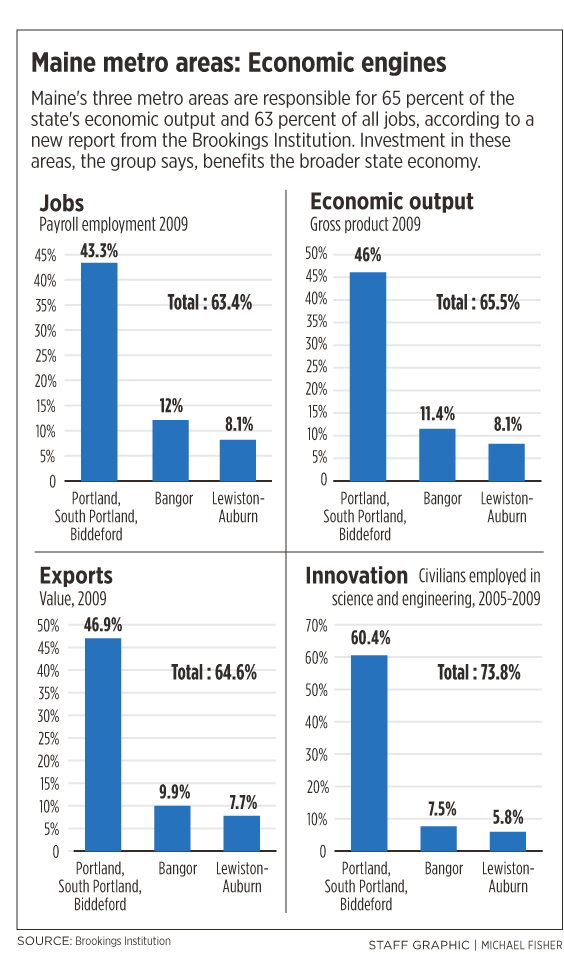The metro area that includes Portland, South Portland and Biddeford has 39 percent of Maine’s population and supports 43 percent of all jobs and 46 percent of the state’s economic output.
It’s also home to 60 percent of the state’s high-skilled workers and 47 percent of its residents with post-secondary degrees — residents who can help drive future economic growth.
Those findings are in a new report from the Brookings Institution, a Washington, D.C.-based public policy research group. They highlight what the group says is the crucial role that metro areas can play in reviving the national economy from the recession.
The report concludes that metro areas in 47 states, including Maine, generate a majority of the economic output. The metro areas also have larger shares of assets that can drive the next wave of economic growth, including international exports, educated workers and development patterns that contribute less to climate change.
States across the country are struggling with budget issues and allocating scarce financial resources for everything from school aid to roads. The tension is especially acute in rural states like Maine, where small towns help define the character and — collectively — carry political influence.
Policymakers should recognize that small towns benefit from investments in metro areas, said Alan Berube, a senior fellow and research director at Brookings.
Products made in rural areas often are sold in or shipped through metro areas, he said, creating jobs away from the cities and suburbs.
The fact that cities have more jobs and economic output than rural areas isn’t a surprise. But what surprises many people, Berube said, is the magnitude of the contribution that metro areas make to state economies.
“The message of the research,” he said, “is that state economies are really the sum of these metro economies.”
The report found 15 states where one metro area accounts for the bulk of all economic output. Those metro areas include Boston, New York City and Atlanta.
Brookings also found that the most innovative and educated workers cluster in metro areas.
The report ranked the Portland region as one of the nation’s largest 100 metro areas, with more than 516,000 residents. The area includes York, Cumberland and Sagadahoc counties.
Maine has two other metro areas, Bangor and Lewiston-Auburn. Together, the three are home to nearly six of every 10 Maine residents. They also are responsible for 65 percent of the state’s economic output and 63 percent of all jobs. They are home to nearly three-quarters of all science and engineering workers and 64 percent of the most educated workers.
The Brookings conclusions echo those in a study done by the Portland Regional Chamber in 2007, a study that’s now being updated. It, too, identified the area’s dominant role in the state’s economic output.
“The better the Portland regional economy does, the better the state does,” said Godfrey Wood, the chamber’s chief executive officer.
All Maine residents benefit from sales taxes generated and income taxes paid in the Portland metro area, Wood said. And the area’s companies help create jobs in rural Maine by using services and supplies from there, he said.
The Brookings report also reinforces a view held by the chamber that it’s easier and cheaper to help businesses stay and expand than to try to attract new employers from other places. The chamber is forming a regional economic development authority to market the area’s assets, with communities working together under a common banner.
“The benefits spill out past Greater Portland,” Wood said.
Staff Writer Tux Turkel can be contacted at 791-6462 or at:
tturkel@pressherald.com
Send questions/comments to the editors.




Success. Please wait for the page to reload. If the page does not reload within 5 seconds, please refresh the page.
Enter your email and password to access comments.
Hi, to comment on stories you must . This profile is in addition to your subscription and website login.
Already have a commenting profile? .
Invalid username/password.
Please check your email to confirm and complete your registration.
Only subscribers are eligible to post comments. Please subscribe or login first for digital access. Here’s why.
Use the form below to reset your password. When you've submitted your account email, we will send an email with a reset code.